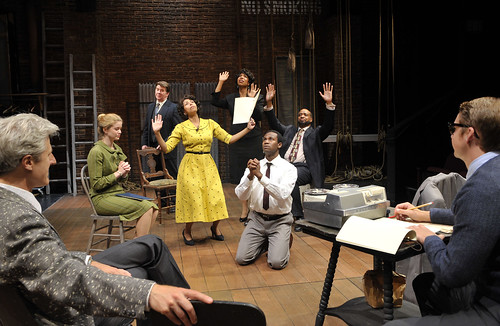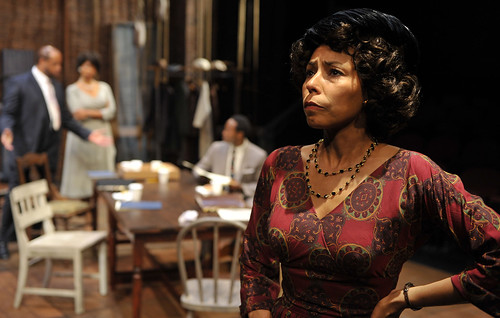Be mindful of Aurora’s Trouble
Margo Hall is Wiletta Mayer in Alice Childress' Trouble in Mind at the Aurora Theatre Company. Photos by David Allen
If only playwright Alice Childress could see Margo Hall's performance in her 1955 play Trouble in Mind now at Berkeley's Aurora Theatre Company.
Hall has long been one of those Bay Area actors you go out of your way to see, whether she's directing, acting or writing. Somewhat unbelievably, Hall is only just getting around to making her Aurora debut, but what a debut! Hall plays Wiletta Mayer, a successful African-American actress on the Broadway stage. Wiletta isn't biter exactly, but she's learned how to play the race game in order to succeed in her chosen field. She's hardened, and this is especially evident when she's instructing a Broadway novice (Jon Joseph Gentry as John) before they begin rehearsals on a new play with a mostly black cast that's bound to court controversy because it's an anti-lynching screed.
"Laugh at everything they say," Wiletta tells John. "Make them feel superior. White folks can't stand unfunny negroes."
John is somewhat taken aback by Wiletta's instruction. "Sounds kind of Uncle Tom-ish," he counters. But Wiletta stands firm. She has learned the hard way that if you want to succeed on the Great White Way (with that middle word being key here), there are certain rules you have to follow, and kissing up to The Man is one of them.
As we meet Wiletta and John's co-stars and creative team, all gathering for the first rehearsal, we see that the black actors have had to bow and scrape just to find work in ridiculous bowin' and scrapin' roles written by white men depicting happy slaves full of mammy-speak. There's even a funny exchange between Wiletta and fellow actress Millie (Elizabeth Carter) about all the roles they've played named after flowers and jewels – so many Gardenias, Petunias, Opals and Rubys.
There's a lot of humor in Childress' play, but this is a serious work about race in America. Wiletta has done things a certain way for a long time, but the more she delves into this anti-lynching play, in which the white folks who realize lynching is wrong emerge as the heroes, the more she realizes the compromises to her self-respect and self-dignity she has made over the years.
To watch Wiletta, so fully and beautifully realized by Hall, come to life as an activist, which is to say someone who is going to push back and stop laughing when nothing is funny, is an extraordinary thing. Hall's masterful performance is full of small but explosive revelations. You see everything going on in Wiletta's mind because it all reads on Hall's face and, most especially, in her eyes. This is a spectacular play to see in the intimate Aurora because there's so much to watch in the faces and bodies of this splendid cast, h eaded by the incomparable Hall.
Director Robin Stanton pitches the entire two-hour play at the ideal pace and tone. On one level, there's work being done – an arrogant director (Tim Kniffin, whose Bill Clinton-esque smarmy charm is perfect here) is trying to make great art from a play he considers important. He's playing mind games with his actors, but what he's really toying with is the very notion of race in America.
Rhonnie Washington is superb as Sheldon Forrester, another journeyman black actor who's not quite as content as Wiletta and tends to squawk when the absurdity gets to be too much. Washington is good for some great, prickly laughs – just watch him try to follow director's orders and whittle a stick during a scene when that's the very last thing his character should be doing. Sheldon also gets some great lines. Speaking of white people in general, he says, "I wouldn't trust one of 'em if they was sittin' in front of me on a merry-go-round."
Sheldon's casual observation about race also rings true: "Two people got the world all messed up – the blacks and the whites."
There's so much that's wonderful about this production, it's hard not to gush. The cast, which also includes Earll Kingston as a doddering stage door manager, Melissa Quine as a Connecticut liberal being tested by her first job on Broadway, Patrick Russell as a beleaguer stage manager and Michael Ray Wisely as a character actor who can never manage to say the right thing. Eric Sinkkonen's set expertly conveys the grandeur of a Broadway theater, while Callie Floor's costumes, especially her sharply tailored dresses for the women, evoke the crisp styles of the '50s.
It's a shame that Childress' Trouble in Mind never made it to Broadway. After a successful off-Broadway run, the play was supposed to make the transfer, but producers apparently wanted a happier ending. Childress wisely refused to make changes (her ending, by the way, is low key but powerful and lingers long after you leave the theater). Trouble in Mind has a great deal to say – the fact that it's more than half a century old hasn't dimmed its humor, insight or provocation.
Wiletta is a different person by the end of the play. The status quo won't work for her anymore. She sees a world that needs to be changed. She says simply and powerfully: "We have to go further and do better."
FOR MORE INFORMATION
Aurora Theatre Company's Trouble in Mind continues through Sept. 26 at 2081 Addison St., Berkeley. Tickets are $34-$55. Call 510 843-4822 or visit www.auroratheatre.org.
